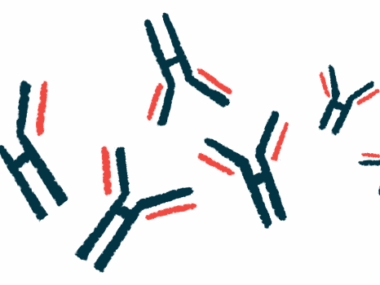Scleroderma lung, skin involvement linked with anti-SSA antibodies
The self-reactive antibodies are an indicator of Sjögren’s syndrome
Written by |

Anti-SSA self-reactive antibodies, a hallmark of Sjögren’s syndrome, are associated with a higher risk of organ involvement in people with scleroderma, including the lungs and skin, a study in Japan shows.
The findings suggest “anti-SSA may be a valuable biomarker of organ involvement and skin severity in patients with SSc [systemic sclerosis, also called scleroderma],” wrote the researchers, who said “periodic screening for these involvements should be recommended in patients with SSc” who are positive for such antibodies.
The study, “Clinical features of patients with systemic sclerosis positive for anti-SS-A antibody: a cohort study of 156 patients,” was published in Arthritis Research and Therapy.
Sjögren’s syndrome is a chronic inflammatory autoimmune disease wherein a misdirected immune attack affects the glands that produce tears and saliva. It’s called primary Sjögren’s syndrome when it appears as an isolated illness and secondary when it follows another autoimmune disease.
Anti-SSA antibodies are a diagnostic marker of Sjögren’s syndrome and are often detected in people with SSc. In fact, studies report that up to 24% of SSc patients have Sjögren’s syndrome.
While SSc patients may have anti-SSA antibodies, but not symptoms of Sjögren’s syndrome, “few studies have focused on patients with anti-SSA-positive SSc, and the clinical significance of this presentation is not fully understood,” wrote researchers in Japan who analyzed data from 156 patients with SSc who were followed at the Yokohama City University Hospital between 2018-2021.
The patients were mostly (88.5%) women, were a median age of 69 and a mean disease duration of 13.3 years. As for SSc subtypes, most (75%) had limited cutaneous SSc and 25% had diffuse cutaneous SSc.
Anti-SSA antibodies in scleroderma
Regarding the self-targeting antibodies that drive SSc, 46.1% were positive for anti-centromere antibodies, 17.3% for anti-topoisomerase-1, 9% for anti-RNA Polymerase III, and 9% for anti-U1RNP. None of the antibodies were found in 21.1% of patients.
Forty-four patients (28.1%) tested positive for anti-SSA antibodies, and 15.4% of these were diagnosed with secondary Sjögren’s syndrome.
The SSc patients who carried anti-SSA antibodies were mostly women (97.7%) with a longer mean disease duration than those without the antibodies (18 vs. 11.4 years). Digital ulcers (45.5% vs. 23.3%), interstitial lung disease (ILD, 61.4% vs. 40.2%) and gastroesophageal reflux disease (GERD, 63.6% vs. 40.2%) were all significantly more common in the group with anti-SSA antibodies. ILD refers to diseases that cause scarring of the lungs, while GERD is chronic acid reflux.
In a multivariate analysis, which is based on the relationship between several variables, the presence of anti-SSA antibodies was associated with a 2.67-times higher risk of developing ILD. The presence of anti-U1RNP antibodies was associated with a 5.38 times higher risk of GERD, whereas anti-topoisomerase I antibodies correlated with a more than three times greater likelihood of digital ulcers.
“These results suggest that anti-SSA presence in patients with SSc is a risk factor for organ involvement, particularly ILD,” wrote the investigators, who also assessed whether having anti-SSA antibodies affected the clinical features of SSc-specific antibodies. The analysis revealed that, for example, the risk of ILD was 20.93 times higher in those with both anti-U1RNP and anti-SSa antibodies relative to anti-U1RNP alone. Also, the likelihood of digital ulcers increased by 3.8 times with the co-presence of anti-SSA and anti-centromere antibodies.
Despite this, diffuse cutaneous SSc was significantly associated with having SSc, but not Sjögren’s syndrome. SSc patients positive for anti-SSA antibodies alone, but without SSc-specific autoantibodies, had a tendency towards thicker skin, the results showed.
The findings show that ILD complications in SSc patients significantly increased with anti-SSA, said the researchers, who noted that “anti-SSA was also associated with different risks of organ involvement, depending on the combination of SSc-specific autoantibodies.”





